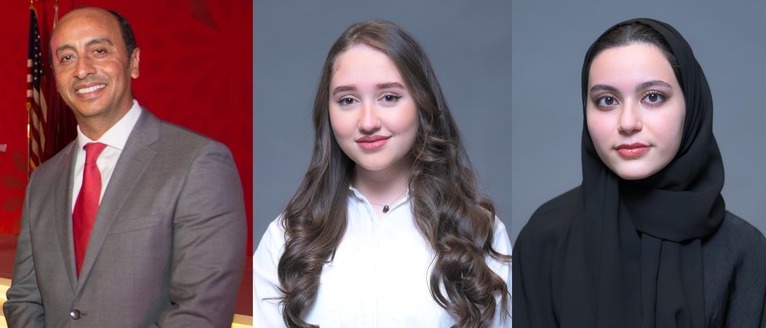WCM-Q students shortlisted for Education City Innovative Entrepreneurship Program
 Dr. Rachid Bendriss, left, Sama Ayoub, center, and Shahad Ibrahim, right
Dr. Rachid Bendriss, left, Sama Ayoub, center, and Shahad Ibrahim, right
Two student projects from Weill Cornell Medicine-Qatar’s (WCM-Q) one-year Foundation Program have been shortlisted for the next phase of Hamad Bin Khalifa University’s (HBKU) Education City Innovative Entrepreneurship Program.
WCM-Q’s Foundation Program is designed to equip talented high school graduates with advanced proficiency in English, math, and basic sciences, in preparation for entry to WCM-Q’s Six-Year Medical Program. As part of the English course taught by Dr. Rachid Bendriss, students were introduced to design thinking projects and assigned the task of developing group projects, which were subsequently submitted to the Education City Innovative Entrepreneurship Program.
The 18-month Education City Innovative Entrepreneurship Program is an annual initiative for Qatar-based entrepreneurs to commercialize their innovative business ideas by addressing priority areas such as progressive education, sustainability, artificial intelligence, precision medicine, or social progress.
The first group of students included Sama Ayoub, Sara Al Kaabi, Yaqoub Al-Jaidah, and Lolwa Al-Abdulghani. The students identified the need to protect the employment rights of people with disabilities, who are often faced with social isolation and an inability to pursue careers in areas they are passionate about. As a response, the students designed a mobile application to regulate the employment process and facilitate access to job opportunities for people with disabilities.
The second group was made up of Shahad Ibrahim, Abdulrahman Al-Namla, and Maha Al-Marri, who focused on finding a solution to ease the challenging transition from high school to university. The group developed the concept of ‘Mentor Me’, a platform that links university student mentors with high school students to offer valuable first-hand knowledge of the highs and lows of the higher education journey.
Dr. Rachid Bendriss, associate dean for foundation, student outreach, and educational development programs, said: “Our students were able to tick every evaluation box in the entrepreneurship program by not only demonstrating creativity, but also value-creation, impact, and feasibility. We are delighted that our Foundation Program paved the way for these young talented students to be shortlisted as finalists in the Education City Innovative Entrepreneurship Program. We look forward to continuing to support and guide them through the next phase of their projects.”
One of the participating students, Sama Ayoub, said: “The goal of our English course project was to develop the ability to solve complex problems in a creative and inventive manner through critical life-long learning skills such as coping with uncertainty and working in a collaborative team. In design thinking projects, considering and choosing a problem involves five phases: empathize, define, ideate, prototype, and test. After brainstorming as a group and looking within our community, we recognized that people with disabilities were at a disadvantage when looking for job opportunities, so we focused our efforts on addressing this key issue.”
Another participating student, Shahad Ibrahim, said: “Making it through the program's initial phase provided us with even more motivation to carry out this plan. We are currently seeking to further develop the concept and our objectives in order to be selected as fund winners, which would empower us to manage our project. The development of ‘Mentor Me’ began in our English class at Weill Cornell Medicine-Qatar and is continuing in the hope of blossoming into a platform that helps students discover more and transition to their desired educational trajectories.”
WCM-Q students are among only 20 entrepreneurs to be shortlisted as finalists in the Education City Innovative Entrepreneurship Program, making them some of the select few to have access to the program’s capacity building training, which includes innovative entrepreneurship, systematic innovation, leadership, project writing, idea pitching, business model and business plan preparations.
In parallel, the WCM-Q student finalists are preparing to submit their projects to the Kickstarter Fund, a competitive fund that supports only five projects with a budget of up to QAR 100,000 each. Each funded project will later be invited to a ‘Demo Day’, which offers participants an opportunity to present their ideas to investors and secure an investment to scale up their businesses.